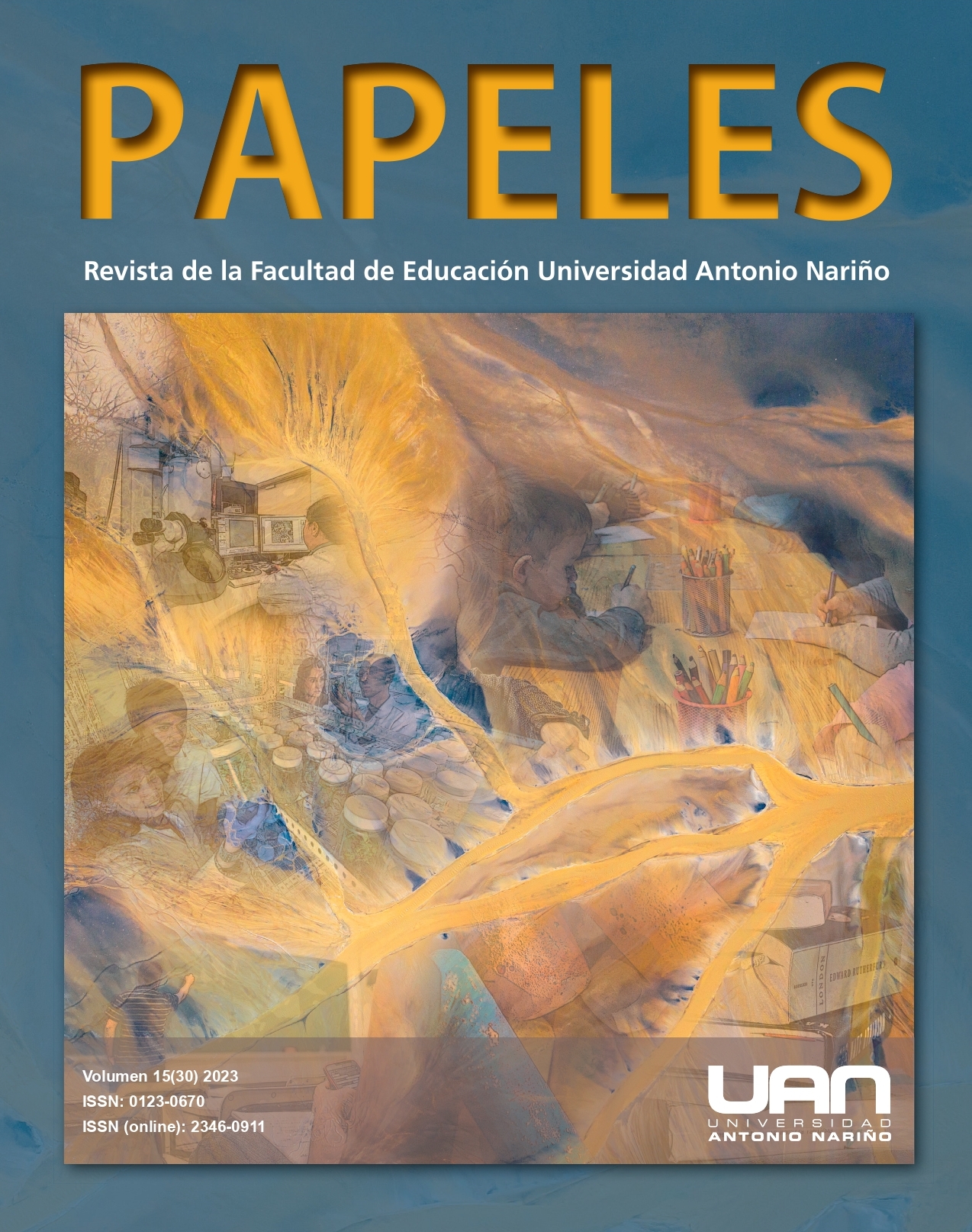Non-sexist language: A proposal to combat gender violence and produce wellbeing in the classroom
DOI:
https://doi.org/10.54104/papeles.v15n30.1488Keywords:
education, Gender-based violence, Non-sexist language, EcuadorAbstract
The recognition and visibilization of women through inclusive language that is promoted in the classroom as a full right to generate equitable environments is a challenge that must be taken up by teachers. The objective of the proposed research is oriented to show how the linguistic resources that teachers can use in their daily work in the classroom through the written and verbal word help to combat gender violence associated with women's right to difference and equality. The methodology is based on a bibliographic and documentary research that serves as the basis for the application of quantitative data collection instruments applied to 91 students and 8 tutors of community practices. The research findings show that the language used reproduces inequalities between women and men, and encourages the assignment of professional roles marked by gender, which unconsciously influences women to enter certain professional fields. Teachers have in their classrooms the opportunity to build spaces free of gender violence using the powerful tool of the spoken and written word.
Downloads
References
Ahearn, L. M. (2001). Language and agency. Annual Review of Anthropology, 30(1), 109-137. https://doi.org/10.1146/annurev.anthro.30.1.109
Bard Wigdor, G. (2016). Aferrarse o soltar privilegios de género: Sobre masculinidades hegemónicas y disidentes. Península, 11(2), 101-122. https://doi.org/10.1016/j.pnsla.2016.08.003
Bengoechea, M. (2003). Guía para la revisión del lenguaje desde la perspectiva de género. https://www.academia.edu/download/68979809/Lenguaje_Guia_lenguaje_no_sexista_castellano.pdf
Corrales González, N., Suárez Perdomo, R., Aportela Valdés, I. B. y Lara Espina, I. (2021). El uso del lenguaje sexista: Una mirada desde la docencia. Revista Iberoamericana de Investigación en Educación, 2(2), 56-66. https://doi.org/10.58663/riied.v2i2.20
De Lemus, S. & Estevan-Reina, L. (2021). Influence of sexist language on motivation and feelings of ostracism. International Journal of Social Psychology, 36(1), 61-97. https://doi.org/10.1080/02134748.2020.1840230
García Jaramillo, J. (2019). Hacia una escuela libre de sexismo: Reflexiones desde el currículo de literatura. Revista de Educación de la Universidad de Granada, 26, 109-124. https://doi.org/10.30827/reugra.v26i0.130
Guerrero Salazar, S. (2020). El debate social en torno al lenguaje no sexista en la lengua española. IgualdadES, 2, 201-221. https://doi.org/10.18042/cepc/IgdES.2.07
Jaramillo-Bolívar, C. D. y Canaval-Erazo, G. E. (2020). Violencia de género: Un análisis evolutivo del concepto. Universidad y Salud, 22(2), 178-185. https://revistas.udenar.edu.co/index.php/usalud/article/download/4060/6285?inline=1
Martini Armengol, G. y Bornand Araya, M. (2018). Hacia una educación no sexista: Tensiones y reflexiones desde la experiencia de escuelas en transformación. Nomadías, 26, 45-67. https://revistateoriadelarte.uchile.cl/index.php/NO/article/view/52440/55028
Ministerio de Ciencia, Tecnología e Innovación Argentina. (2020). Recomendaciones para una comunicación no sexista. https://www.argentina.gob.ar/sites/default/files/documento_completo_06_08_2020_0.pdf
Murillo-Vargas, G., González-Campo, C. H. y Piñeros, A. S. (2021). Modelo de evaluación del bienestar estudiantil universitario en Colombia. Formación Universitaria, 14(2), 133-140. http://dx.doi.org/10.4067/S0718-50062021000200133
Núñez Cortés, J. A., Núñez Román, F. y Gómez Camacho, A. (2021). Actitud y uso del lenguaje no sexista en la formación inicial docente. Profesorado: Revista de Currículum y Formación del Profesorado, 25(1), 45-65. https://doi.org/10.30827/profesorado.v25i1.13807
Organización de las Naciones Unidas para la Educación, la Ciencia y la Cultura. (1991). Recomendaciones para un uso no sexista del lenguaje. https://unesdoc.unesco.org/ark:/48223/pf0000114950
Pérez Iglesias, J. L. (2019). Identificación de valores sexistas: Análisis del currículum oculto en el aula. Universidad de Salamanca. https://gredos.usal.es/bitstream/handle/10366/140589/MID_19_105.pdf?sequence=1
Roig-Vila, R. (ed.) (2019). Investigación e innovación en la enseñanza superior: Nuevos contextos, nuevas ideas. Octaedro. https://rua.ua.es/dspace/handle/10045/98731
Rojas Blanco, L. y Rojas Porras, M. E. (2015). Guía de uso del lenguaje inclusivo de género en el marco del habla culta costarricense. Universidad Nacional de Costa Rica. https://repositorio.ciem.ucr.ac.cr/jspui/handle/123456789/192
Ruiz-Cantero, M. T., Simón-Rodríguez, E. y Papí-Gálvez, N. (2006). Sesgos de género en el lenguaje de los cuestionarios de la Encuesta Nacional de Salud 2003. Gaceta Sanitaria, 20(2), 161-165. https://doi.org/10.1157/13087330
Salerno, P. (2019). Lenguaje, género y los límites de la desigualdad. Tábano, 15, 109-115. https://repositorio.uca.edu.ar/bitstream/123456789/9424/1/lenguaje-genero-limites-desigualdad.pdf
Sánchez, E. (2017, 18 de diciembre). ¿Qué factores inciden en el bienestar? La Mente es Maravillosa. https://lamenteesmaravillosa.com/que-factores-inciden-en-el-bienestar/
Silva, M. L. M. da P. & Da Costa, M. A. T. S. (2018). Discussões de gênero e feminilidades na escola contemporânea. INTERthesis, 15(2), 55-72. https://doi.org/10.5007/1807-1384.2018v15n2p55
Tosi, C. y Sardi, V. (2021). Lenguaje inclusivo y ESI en las aulas: Aportes teórico-prácticos para un debate en curso. Paidós.
Universidad Nacional de Educación a Distancia. (s. f.). Guía de lenguaje no sexista. https://www.udc.es/export/sites/udc/oficinaigualdade/_galeria_down/documentos/GUIA_LENGUAJE.PDF
Vasallo, B. (2021). Lenguaje inclusivo y exclusión de clase. Larousse.
Wodak, R. (2015). Gender and language: Cultural concerns. En International encyclopedia of the social and behavioral sciences (pp. 698-703). Elsevier. https://doi.org/10.1016/B978-0-08-097086- 8.64018-7
Downloads
Published
-
Abstract666
-
PDF (Español)338
How to Cite
Issue
Section
Categories
License
Copyright (c) 2023 Maria del Pilar Viteri Vera, Jorge Coca Benítez, Dolores Ortíz Guevara

This work is licensed under a Creative Commons Attribution-NoDerivatives 4.0 International License.






